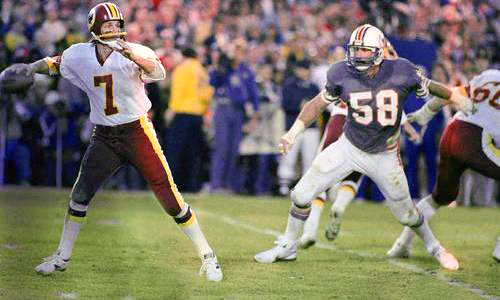
Concordia Was A Catalyst For Former NFL All-Pro
Article reprinted courtesy of Fargo Forum and reporter Eric Peterson. Photograph courtesy of the Associated Press
Moorhead - When Kim Bokamper came to Concordia to play football in 1972, he was a "tall, gangly kid" remembers then-Cobbers head coach Jim Christopherson.
The freshman – who went to high school in the San Jose, Calif., area – made a strong early impression with his 40-yard dash time.
"We did 40s on everyone the first day or two," said Christopherson. "He ran a 4.7. … When you have a kid who is 6-foot-4, 210 pounds and runs that fast, we're going to take a good look at him."
Bokamper played one season with the Cobbers, triggering a college career that would culminate with him being a first-round NFL Draft pick. He went on to have a nine-year career with the Miami Dolphins and played in two Super Bowls. Bokamper is one of two former Cobbers to play in the Super Bowl.
"We hope we launched his career a little bit," Christopherson said.
Bokamper – who is now a sports anchor for the CBS affiliate in Miami – may not have played college football had it not been for a Concordia connection.
"I was actually about a month away from joining the Navy," Bokamper said. "That's kind of what my family's tradition was."
Bokamper said he "really wasn't recruited" by any colleges coming out of Milpitas High School where Ron Hausauer was his head coach. In the 1960s, Hausauer played football at Concordia.
After Hausauer found out Bokamper wanted to play more football, he contacted his alma mater.
"One thing led to another, and next thing you know I was on my way to Minnesota with two of my other (high school) teammates," Bokamper said.
Bokamper was initially slated to play tight end for the Cobbers. Early in the season, he was moved to defense after a key player suffered a knee injury.
Bokamper emerged as a starter in his freshman season at Concordia.
"I had the opportunity as a freshman to play on the varsity team," Bokamper said. "That gave me a lot of confidence that I could play at the college level."
During that school year, Bokamper's mom passed away. That was the main reason he ended up leaving Concordia.
"I kind of felt a need to get back close to my father, my family," he said.
Bokamper transferred to San Jose City College and played there a season.
He played his final two college seasons at San Jose State under head coach Darryl Rogers, who would later become head coach of the Detroit Lions.
"It's funny because everybody you meet thinks that you were recruited by everybody in the country and you went to Michigan or Ohio State or Southern Cal," Bokamper said. "I kind of went the bump-and-grind route a little bit. … The NFL was never really a consideration."
The Dolphins selected Bokamper No. 19 overall in the 1976 NFL Draft and he became part of the "Killer B's" defense. Bokamper, who played at 6-foot-6, 250 pounds in the NFL, was a linebacker and defensive end. He started in both Super Bowls XVII (1983) and XIX (1985).
Miami lost both games – the first to the Washington Redskins and the second to the San Francisco 49ers.
"The disappointment of not winning the Super Bowl sticks with you," Bokamper said. "It's almost not worth getting to the game, the disappointment that comes with losing it."
One story that sticks with Bokamper from his days at Concordia had nothing to do with football.
Bokamper was playing basketball in the gym with a few friends. The school had traded out the glass rectangular backboards (used for college games) for the glass fan-shaped boards (which high schools used at the time). Concordia was hosting a high school holiday tournament.
"I went up there and dunked a ball and broke the high school basketball backboard," Bokamper said. "It shattered."
Bokamper – scared of what the consequences may be – quickly left the gym along with his friends.
Bokamper thought he may get kicked out of school, and got a call from Christopherson later that night.
"He was a wonderful guy," said Bokamper. "He said, 'Don't worry about it.' Really after that, I felt bad about not coming back because he had backed me up in the deal."
Christopherson would have liked for Bokamper to remain in the program, but understood why Bokamper needed to go back home.
"I remember him being a tremendous young man," Christopherson said. "Those are the kind of kids we look for at Concordia. … But family comes first."